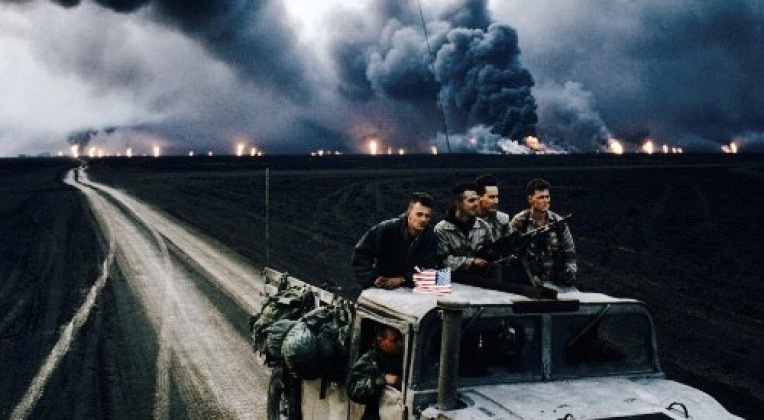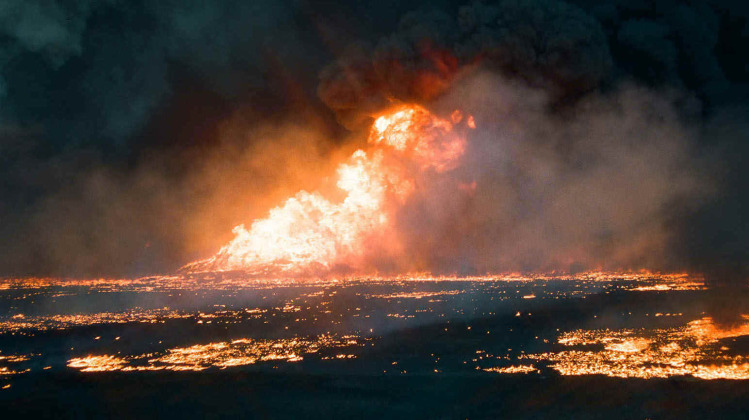Extreme Scorched Earth: How Britain and America Planned Nuclear Attacks on Middle Eastern Oil Fields to Deny Enemies Their Wealth

Nuclear Explosion
Oil began to replace coal as a key energy source for advanced industrial economies in the early 20th century, leading to the emergence of several strategic challenges for the developed world as industrial powers sought to access oil reserves.
Unlike coal, which could be mined across much of the world from Britain and Germany to Korea and China, oil reserves were far more concentrated in specific regions most of which were in the third world and far from any developed economies. Maintaining access to this resource became a key strategic imperative for the world's major powers, and with the Middle East at the time being the world's foremost oil exporting region control of the Arab and Iranian oil fields located around the Persian Gulf became a matter of great strategic importance.
While the region was previously of little strategic value, it soon become a key priority of the British Empire in particular to maintain influence over the Middle East and control over its oil supplies. Britain invested a great deal in Middle Eastern oil exploration after the First World War, and began to reap significant economic and strategic benefits from the region's production. Iran, Iraq, Kuwait and Saudi Arabia all hosted contingents of British personnel to protect these assets.
British companies succeeded in finding and extracting Middle Eastern oil, while its military would play a key role in keeping these strategic reserves out of the hands of Nazi Germany and its Fascist European allies in the Second World War. In the aftermath of the war, as Britain's power declined globally, the United States came to adopt the role of the dominant Western power in the Middle East.
British strategic interests were still largely accommodated and American objectives in regards to the region and ensuring its oil supplies served Western interests remained largely the same as those of its predecessor. The outbreak of the Cold War saw renewed efforts by both Britain and the United States, and to some extent by the wider Western Bloc, to keep Middle Eastern oil under Western control and out of Soviet hands.

British Soldier in Aden, Yemen
The Soviet challenge to Western hegemony was considerable, with the West's reliance on Middle Eastern oil well known to all including Moscow. The USSR bordered both oil rich Iran and strategically located Turkey, and had the country expanded its influence southwards there was a risk not only that Western Bloc would lose one of its most critical economic and strategic assets, but also that these assets would fall into the hands of a Soviet-aligned government and undermine a major Western advantage.
It was imperative for the Western Bloc to prevent their Cold War adversaries from ever gaining control Middle Eastern reserves at all costs, and it became a strategic necessity in the face of the growing threat of oil supplies changing hands to develop precautionary measures to deny these resources to an enemy should attempts to maintain control over them fail.

U.S. Soldiers Drive Away From Burning Oil Field
In 1949 U.S. President Harry Truman signed National Security Council policy NSC 26/2, which sought to deny the USSR access to strategic resources and facilities in the Middle East should they risk falling into Soviet hands. This entailed preparing Western oil company employees for sabotage operations against their own facilities if ordered to do so by Washington.
Britain for its part enthusiastically supported this strategy and offered to aid oil company employees in their strategically critical mission with Royal Air Force assets. In the 1950s problems began to emerge with NSC 26/2 - namely that Iran and Iraq had both began to operate oil fields increasingly autonomously resulting in a reduced presence of Western workers which undermined the Western Bloc's ability to sabotage the facilities if required.
Britain's solution was to rely on a far more overt application of force to destroy oil infrastructure - namely using its newly acquired nuclear weapons. Nuclear arms were referred to by Britain's Joint Chiefs of Staff (JCS) as the "most complete method of destroying oil installations."
While it remains unclear whether the United States was directly involved in these plans, the JCS did have official sanction to request the U.S. use its own far more formidable nuclear arsenal to deny Western adversaries access to Middle Eastern oil infrastructure. Indeed, JCS judged nuclear strikes by the U.S. Military to be "the only (remaining) feasible means of oil denial." CIA operative George Prussing, who was assigned to work with Western oil companies on 'denial' plans in the Middle East, investigated the feasibility of various "denial" proposals and personally inspected Iranian oil fields to determine the feasibility of various means of destroying them. He deemed ground demolition to be more effective than nuclear weapons, and such plans were again main possible by the growing number of Westerners employed in oil producing countries which made the risky involvement of local workers unnecessary.

Burning Oil Fields During Operation Desert Storm - 1991
With the emergence of an Arab Nationalist power bloc in the 1950s several Arab states including oil rich Iraq and Libya slipped away from the Western sphere of influence and cultivated close ties with the Soviet Union following the overthrow of their Western aligned monarchies. As a result Western plans were expanded to include precautions against this new secondary challenge to Western regional dominance, and NSC 26/2 was abandoned in favour of NSC 5714.
New plans relied more heavily on military forces, and sought to sabotage oil production facilities if they fell into the hands of either the USSR or the Arab Nationalist Bloc. Ultimately neither NSC 5714 nor NSC 26/2 were ever implemented, although the U.S. did reportedly threaten military action against Saudi Arabia to secure its oil fields in 1973 in response to the country's oil embargo against certain Western countries that year.
The Gulf War and the initiation of Operation Desert Storm in 1991 to restore the Western aligned Kuwaiti monarchy and prevent Iraq from gaining control of a large portion of Middle Eastern oil fields was largely carried out to protect Western oil security, as allowing such large oil reserves to fall into the hands of the Soviet aligned nationalist government of Iraq was seen as an unacceptable strategic risk.
What U.S. and British operational plans for strategic denial demonstrated was the importance to the Western Bloc of maintaining a strategic and economic advantage over the Soviet Bloc by controlling Middle Eastern oil reserves and denying this advantage to the USSR or to Arab nationalist states at any cost - including if necessary the destruction of these resources with nuclear force.
Kerbau....
ReplyDeleteMilitaries everywhere have detailed plans for almost any contingencies.
Russia no doubt has plans to cemetery devastate USA and Europe with Nukes,
and CCP no doubt has detailed plans for nuclear devastation of USA and allies, seizure of Middle Eastern oil fields.
There was a big hoo ha some years ago when it was revealed that the Singapore Armed Forces had detailed plans to seize a huge chunk of Johore territory as well as "neutralise" Malaysian defences elsewhere. Likely in case of an existential threat by Malaysia to cut-off water supply to Singapore.
ReplyDeletePeople were screaming how evil is Singapore.
I told people - Of Course the Singapore Armed Forces have detailed plans to seize large parts of Johore, if ultimately necessary.
Their generals would be considered sleeping on their jobs if they Didn't have such plans ready to pull off the shelf , if it became necessary.
They probably practised it many times, too, probably on Australian soil...wakakakaka...
"US-UK Extreme Scorched Earth" - TIPU Title
ReplyDeleteNeither US nor UK practiced scorched earth during Operation Desert Storm. The fires were lit by retreating Iraqi forces, on Kuwaiti and Iraqi oil facilities. Why the misleading pics which looks photo shopped.
These r the geopolitic stories just after the WWII.
ReplyDeleteNow, the scenarios have changed.
Soviet has collapsed while US is a net exporter of oil thanks to his newfound environmental destructive shale oil technology.
Russia has tons of gas & oil reserves & there r many willing buyers in EU, hunger for them.
But USofA wouldn't having his key European alliances (pseudo-vessel states) to depend their thermal energy needs on his opponent & enriching the russko too! Thus the strong clamped down on North Stream II project.
China is an oil & gas resources limited country. Her rapid growth depends heavily on imported oil&gas, mainly from the Middle East.
By playing MiddleEastern geopolitics & intercult blood feuds within Islam uncle Sam has a viable control hand in 'managing' both Russia & China influences in that region.
Russia can he manipulated via spot oil price fluctuations. Since it depends heavily on exported oil/gas to sustain the failing economy.
The main transportation route of oil/gas to China, from MiddleEast, goes through key sea lane controlled by the vessel & semi-vessel states of uncle Sam. Though it's changing, many thanks to Trump's maga movement!
There is also that unethical tie of US$ with the oil price. This link helps to maintain the dominant world trading power of the US - allowing USofA to print unlimited dollar notes to 'tax' the rest of the world as the undisputed reserve currency.
Hence, the creation of US seigniorage. It may be counted as revenue for a government when the money it creates is worth more than it costs to produce. This revenue is often used by governments to finance portions of their expenditures without having to collect taxes fro any country that uses the US dollar.
Thus, Yankee insistent presence in this cursed land, with the helps of the Zionist Israel to sustain the US hegemony.
The possibility of nuclear bombing the MiddleEast, to 'exterminate' it's oil/gas productions was the brainchild of the cold war era.
It could no longer be possible due to the new shifts in MiddleEast politic alignments. More so too, those countries, within that land, wouldn't be as malleable politically as they used to be. No thanks to that fraudulent & failed Arab Spring movement initiated by the Yankee, with pommie's long established blue blooded connections.
Enuff said!!
i dun live in middle east, i live in asia, ccp now wanna invade asia countries, seize our land n sea, n denying us democracy. ccp is the problem, we need usa/uk/5eyes/eu or wharever that can fight the communist.
ReplyDeleteKeep to yr demoNcratic dream of Chiba bashing!
DeleteSoon u will he waking up nowhere.
the tide is for all to see, everyone know who is behind myanmar junta, thats y the people burn down ccp factory, meanwhile in msia, green communist running here there everywhere, jumping up down every corner with no more parliament in sight, pretty obvious marx ideology stage a comeback.
DeleteWakakakakaka…
DeleteStill deep into yr f*cked katak fart induced hallucinations!
Reading inconsequential katak footprints better than reading real political tea leaves!
No need to silent a hullucinated 犬养mfer's cloaking.
Very well put CK...more or less all in a nutshell.
ReplyDeleteIt does look most unlikely for the deployment of nuclear bombing in the M.E now.
Iran recently signed a 25 year trade deal with China amidst unilateral American sanction. The EU has stayed silent. The US, for all its hegemonic power of the dollar and military might, has failed to stop the deal. This is an AmeriKKKa that can sanction any person or state in the world, that can assassinate any person overtly or covertly.
Going forward, it is likely for a scenario of many nations bypassing the SWIFT system, although not entirely, which will eventually lead to other currencies like Euro and Yuan based payment system free from the threat of the US Treasury. A gradual multi-currency payment system leading to a multi-polar world balance of power.
The world needs alternatives to the dollar simply because a 4% of humanity ( which the US represents ) cannot lead the rest of world by the nose in perpetuity.
I think this Iran deal will be studied as the landmark for the Yuan ascendency in the 21st century.